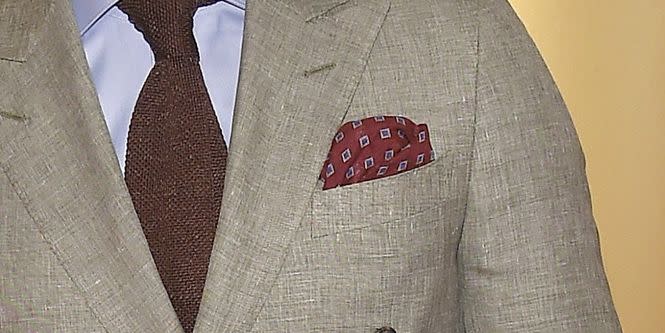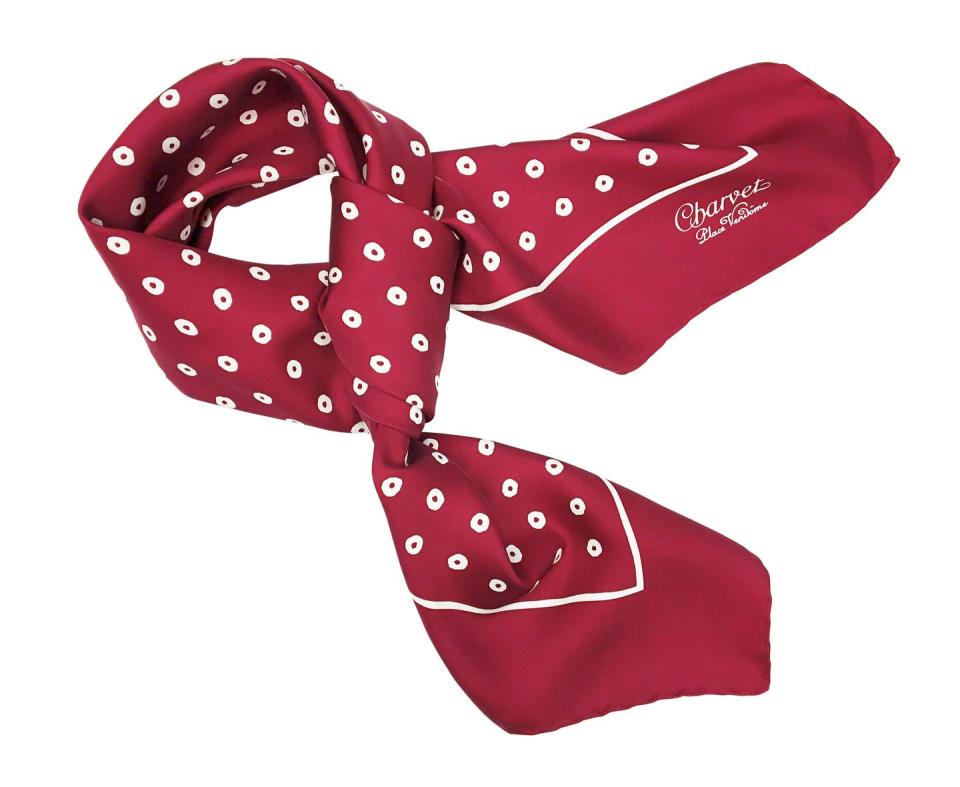The Surprising Obsession of 'Call Me By Your Name' Author Andre Aciman

This time it isn’t a person, it isn’t a rare book, nor is it a house in Italy that I’m in desperate pursuit of. This time it’s just a pocket square, a pochette.
When I first see it, in a shop on Madison Avenue, it flits in and out of sight, an object whose presence I am not fully registering and have no interest in observing. I am focusing on other things: a tie, a sweater, a pair of gloves. But on my way out, there it is again. Within seconds my indifference morphs first into a whim to look at it once more; then it intensifies into a form of curiosity, an urge to keep staring without knowing why; and finally, as I decide to give it a third glance, into an indefinable need, a fixation I can’t explain.
The 19th-century French writer Stendhal, struggling to fathom what it was about a face or a work of art that set him off on a passionate quest to possess it, wrote that beauty held a promesse de bonheur—a promise of happiness. The little pocket square I spotted a mere 10 minutes ago, I now need to touch it, to own it, to make it mine and no one else’s, because it promises to make me like myself a bit more and bring me something I’ve been yearning for all my life, something that might even help me become who I’ve always wanted to be but had almost lost track of and am about to recover now thanks to a flimsy little piece of fabric.
We frequently fall in love with people and with things not for who they are but for who they let us think we are.

For the moment the pochette and I are just exchanging glances, barely flirting. We haven’t connected yet—just smiles, like strangers on a dance floor. Eventually I muster my courage and ask the salesman to let me see it—by which I mean “with my hands.” He opens up the case ever so softly, slides open the drawer filled with similar squares, gently picks one up, and lets me hold it. But I’m not sure I’m ready to buy it, or don’t want to decide just yet, so I pretend I’m not convinced, and shake my head. He has seen this frown many times. It means I’m buying.
A day or so later I step hastily inside the store again, hoping (a) that the pochette has disappeared, so I won’t have to think of it again, or (b) that I’ve started caring for it less. But no. It’s still there, folded neatly in the same glass case, waiting. It knows me. It speaks my language, bears my name almost. I want to know its secret, its make, the reason it caught my eye and hasn’t let go.
I’m running late for a meeting but decide to ask another salesman to let me see it. All the silk pochettes in the case are made by the same house in Milan, Bigi, all knitted, not woven, in dark colors with contrasting borders. This salesman not only lets me hold it, he unfolds it for me. I want it even more now. What is it that haunts me? Is it its unusual pattern, its colors, its feel, its craftsmanship? Or the seemingly casual way it’s been unfolded, as if to make me think I already own it? I eye the price. Again the frown, again the salesman’s gaze that says, “I’ve seen this done before. You’ll be back.”
I have never been given to impulse buying. I experience buyer’s remorse even before purchasing anything. And I have never been the sort of man who would easily strike up a conversation with strangers and then invite them for coffee. I hesitate, I distrust my own instincts, and I invariably opt to do nothing. So, unable to make up my mind about the pocket square, I walk out of the store resolved either to end this sudden romance or at least to put it on hold, to reconsider—always to reconsider. I am a creature of prevarication and ritual.

There are the before rituals and the after rituals. I am well acquainted with both.
Before rituals: This is when I reevaluate whether I want or need the pocket square—the way I reevaluate everything, whether it’s a job offer, a writing assignment, a dinner invitation, or someone’s friendship that promises to open new vistas. Invariably I come up with all manner of reasons to defer and ask questions instead. Am I buying it to impress colleagues, contacts, or someone special? Will a piece of designer cloth or a house at the beach or another trip abroad really make me happy, win me friends, and influence people? Am I buying it for me or, more precisely, for the new me who will finally burst forth into the limelight like an outfitted jack-in-the-box besotted by his new apparel?
The reasons not to buy are so persuasive. Still, I return to the same store a few days later, ask to examine it yet again, have it unfolded once more. But again I leave empty-handed. A week later, same thing. More niggling questions: What is it made of? Is it the customary size for a pocket square or is it smaller? Might I have a look at another of the same make? The new salesperson doesn’t know that this is my fifth visit.
There is a side of me that is tired of my shilly-shallying. But there is another that enjoys it and thinks that if I vacillate so much it might be because I’m not so sure I even like this item. Isn’t there something a touch gaudy, maybe even loutish, in the pochette’s not-so-muted swank? Could it be that it actually repels me and that I’ve mistaken its faux glam for elegance?
But in the end, it is pointless to resist. I step into the store again one evening and, in a gesture that lasts no more than a minute, buy the pocket square. I’ve done this so many times in the past: the Marinella ties that took at least two weeks to buy; the Borsalino panama I finally purchased on my very last day in Italy, when I no longer needed it to block the sun; the Montegrappa fountain pen I still can’t bring myself to use for fear of dropping it; the Drumohr cashmere vest I spent a fortune on, did wear, and ruined by tossing into the dryer.
Once I’m home, the after rituals begin. I won’t even touch the new pocket square, much less wear it. I keep it in its original box on a table in my study—as if it’s on probation and might be taken back to the store if I feel so much as a ripple of doubt. Which is why I also keep the receipt handy. Besides, I don’t want what is new to feel entirely naturalized, mixed in with the residents of my closet. I eventually find a space for it next to, but not with, my other pochettes, promising to take it out of its box when it is ready to join their clan and acquire their drawer habits, possibly even their scent, the way we’ll gladly accept someone into our home night after night but feel a touch squeamish about handing them our keys.
Truth is, I don’t know what I feel yet and need to quarantine my new pochette in this purgatory of new possessions. Or maybe it’s just that I want to enjoy its newness, and the only way to do so is to avoid thinking I own it. This could just be my most cunning way of extending its appeal—pretending it’s still a stranger and might decide to walk out on me. I’m like someone who refuses to memorize the telephone number of a person he knows he’s falling in love with. By keeping the number intentionally unfamiliar, he nurses the illusion that the relationship is newer than it is and that he is therefore far less vulnerable than he fears.
Meanwhile, in the neglected harem of pocket squares, resentment and rebellion are brewing. It says somewhere that favoring the brand new too overtly, like favoring the youngest born, is a form of arrogance and brings bad luck. A new item alters our relationship with fate and can bode ill if not properly inducted. The Greeks were all too aware of this. They knew that before the new could be elevated, something old needed to be given up as an offering. In my case, I need to propitiate the god of pocket squares. But it cannot be with something I already consider dispensable. You have to love whatever you are giving up; otherwise it is no sacrifice. So I’ll get rid of a well-worn tie.
Finally the honeymoon begins. At a business lunch my eyes unavoidably drift to my breast pocket. “Pocket square, I love you.” I catch my reflection on the street—same thing. It is, dare I say, mutual. But I don’t want to overdo things. A few days later I turn back to the older pocket squares, just to be fair, and decide to wear one, except that on my way out I have a change of heart, turn back, and opt for the new one once again.
Thus begins a wonderful affair. It may last a lifetime, or it may not. I don’t want to know, and I don’t care. Right now we’re on fire.
But I do know. Nothing lasts. One evening I pass by the store, and there it is: my pochette. I left it home today, sitting quietly with its siblings, who have grown to like it. But in the store it now looks slightly demoted, on sale at 40 percent off. This is when I begin to eye the new, more colorful pocket squares, and by extension the new me I know is still standing in the wings somewhere, waiting for the limelight.
The romance is fading, but I’m not quite done with my pochette yet. I fight rising misgivings. I blame a thread that has come undone, I blame folds that won’t go away, I even feel a twinge of guilt each time I riffle through my pocket squares and overlook the one I thought I’d always love. I blame fickle fashion, I blame friends who have seen me wear it too many times, and finally I blame myself, with that tired but reliable bromide I’ve used in other circumstances: It’s not you, it’s me. Not your fault, my dear, dear Kenzo scarf, or Charvet tie, or Simonnot Godard belt, not your fault, any of you, but mine—mine for being so frail, so vain, mine for mistaking you, the mask, for the face I wish were mine, mine for not remembering, once again, that joy is never in the object, never even in love, but in the hunt and the ever elusive promise of happiness.
This story appears in the October 2018 issue of Town & Country. Subscribe Now
You Might Also Like

